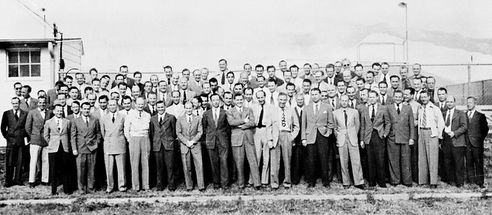 Former Nazi Scientists, White Sands NM (1946): Wernher von Braun is first row, seventh from the left, handkerchief in breast pocket.
Former Nazi Scientists, White Sands NM (1946): Wernher von Braun is first row, seventh from the left, handkerchief in breast pocket. Science Political
Written by Annie Jacobsen, Operation Paperclip: The Secret Intelligence Project that Brought Nazis to America (2014), is a tale long suspected by those of my generation (baby boomers). The truth found in Jacobsen’s book is that departments of the American government, specifically the State Department, FBI, CIA (originally the OSS) and the Pentagon, went way beyond “hiring” Wernher von Braun and a few other rocket scientists to help run the American Space Program.
As a child, I remember seeing pictures of a smiling von Braun, living in Huntsville Alabama, helping us with our nascent space program. After all, it made sense that you’d want to grab the cream of the crop from the Nazis, if for no other reason than keeping them from falling (willingly or otherwise) into the hands of the British, French, Russian and others who would want to make use of their rocketry knowledge. Long ago after I grew up I learned it was an American GI who slipped Hitler’s second in command, Reichsmarschall Herman Goering, a potassium cyanide capsule to help him cheat the hangman’s noose at Nuremberg. Later still I heard it was the Americans who concealed uber-criminal Klaus Barbie from the French, who desperately wanted to try him for war crimes (atrocities) committed during the war in France.
 Dr. von Braun became Director of the NASA Marshall Space Flight Center on 1 May 1964.
Dr. von Braun became Director of the NASA Marshall Space Flight Center on 1 May 1964. And now, at the end of 2014, Americans are shocked to learn that Nazis were paid US Social Security benefits. Annie Jacobsen enlightened us as to our involvement in Operation Paperclip; more now from Congress, who just overwhelmingly approved a bill stripping Nazis of the pensions we the US government offered them to just go back to Europe without an argument. That’s right, giving Nazis pensions to leave the country even though they’d entered illegally.
All in all nearly 1,600 Nazis were sneaked into the US under the rubric “Operation Paperclip” (for the paper-clipped info on Nazi dossiers so the truth could be removed when necessary). Using various forms of subterfuge, the operation paid, fed, housed and utilized former Nazis in US government agencies without the knowledge of Congress or the general population of American citizens. There were comic instances as well; one former Nazi working at Fort Bliss had passed himself off as trained in rocketry – in reality, he had been a cafeteria worker at a Nazi rocket facility.
There are many reasons to go to war: stupidity, self-preservation if attacked, striking preemptively an enemy thought to be ready to strike you, and others. There are gains to be made in a war whether a country wins it or not. For example, in the Battle of Kadesh, when Egyptians met Hittites in Palestine some thousands of years ago, it was generally thought to be a draw, but as far as we can tell reading hieroglyphics and other historical writings, Ramesses claimed victory and his version was accepted … in Egypt that is. These advantages to come of war, such as material profits, territorial gain, and national prestige, play another role as well, one noted by Orwell in his 1984: “the object of waging a war is always to be in a better position in which to wage another war.”
William Abens, author
Video: Bringing Nazi Scientists to America – Annie Jacobsen
Next: a 70th Christmas Eve WW II story in two-parts beginning Wednesday 24 December, with Leo Barron and Don Cygan’s No Silent Night, The Christmas Battle for Bastogne.
Posted by Bryan W. Brickner
 RSS Feed
RSS Feed
